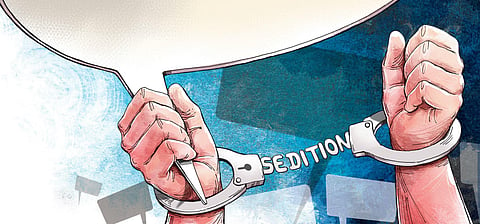

Recently, a Bollywood star made a controversial remark about India's freedom struggle. She called India's Independence as alms given by the British. The sensible thing would have been to ignore such a rant and get on with our lives.
But the reaction from the so-called liberals was revealing about how liberal they were. They wanted sedition charges to be slapped on her, thus proving that they are no different from those they oppose and often sermonise.
The democratic mentality is about the ability to accept the right of the people to believe and express all shades of opinion, even unpalatable or obnoxious ones. It isn't about cheering only for what one wants to think or for views that cater to one's prejudices.
If some people want to believe that India won freedom only in 2014 or the earth is flat or that green Martians land in their kitchen garden to sing lullabies for them every night, our Constitution gives them the right to have such beliefs even express them without fear.
Those who do not want to believe in green Martians, flat earth, sky daddies, or India having won freedom only in 2014 can choose so. But to demand sedition charges for someone expressing their ignorance is ridiculous. Delusion is not a crime. Sucking up to powers may be reprehensible, but they don’t warrant sedition charges.
Sedition law is a colonial-era hangover. Sedition 124A of the Indian Penal Code was drafted by Thomas Macaulay and included in the IPC in 1870. It states, 'Whoever, words, either spoken or written, or by signs, or by visible representation, or otherwise, brings or attempts to bring into hatred or contempt, or excites or attempts to excite disaffection towards the Government established by law in India shall be punished with imprisonment for life, to which fine may be added, or with imprisonment which may extend to three years, to which fine may be added, or with fine'.
Mahatma Gandhi called Section 124A the prince among the political sections of the IPC designed to suppress the citizen's liberty. In Jawaharlal Nehru’s opinion, the provision of the colonial government was obnoxious and highly objectionable, and the sooner we get rid of it the better.
Ironically, Nehru, the champion of free speech and the poster boy of modern liberal politics in India, brought back this colonial law in the First Amendment to the Constitution in 1951. However, Nehru went one step further than the colonial masters he replaced.
His ministry strengthened the sedition law by adding two expressions: 'friendly relations with foreign state and public order' to restrain free speech. Sedition charges are a non-bailable offence. A person charged under this law must forfeit his passport and can't apply for a government job.
The pattern of crying foul against such laws while not in power and using such draconian acts when in power is a game that has been and will be played by all political parties.
The terms like “bring into hatred or contempt” or “attempt to excite disaffection” are kept as vague as possible, which helps the police and the government suppress differing opinions or criticism. The broad definition of what is seditious is a mighty sledgehammer to slam one’s opponent.
A few months ago, Justice DY Chandrachud, while restraining the Andhra Pradesh government from taking adverse action against two Telugu news channels booked under Section 124A (sedition) of the Indian Penal Code (IPC), said that "everything cannot be seditious. It is time we define what sedition is and what is not".
Which politicians would voluntarily give away the power to silence his critics? When we have a law that can frighten, silence, and manipulate the people and the media and the press, it would be utopian to believe that the rulers are either dumb or idealistic not to use them.
But, unfortunately, none of our politicians reached where they are by being either. The conviction rate is less than 3 percent in sedition charges, but the process is the punishment in India. Nothing warrants sedition charges in a modern democracy. No one should be above criticism, including the founding fathers or the Father of the Nation.
No religion, political parties, political leaders, holy men, holy books, sports stars, cricket team, film stars, historical figures or living, dead, imagined, or hallucinated heroes should be considered so sacrosanct that criticising them would result in death or jail term.
To expect the politicians or our elected representatives would repeal the sedition law would be foolish. The hope lies with the honourable Supreme Court to remove this law’s vague and sweeping provisions and define what constitutes sedition. It will be an excellent service to our fledgling democracy if the court strikes down this law in total.
(The writer is author of Asura, Ajaya series, Vanara and Bahubali trilogy. He can be contacted at mail@asura.co.in)